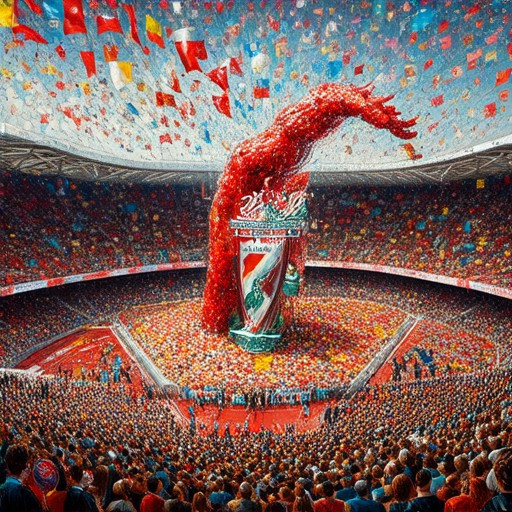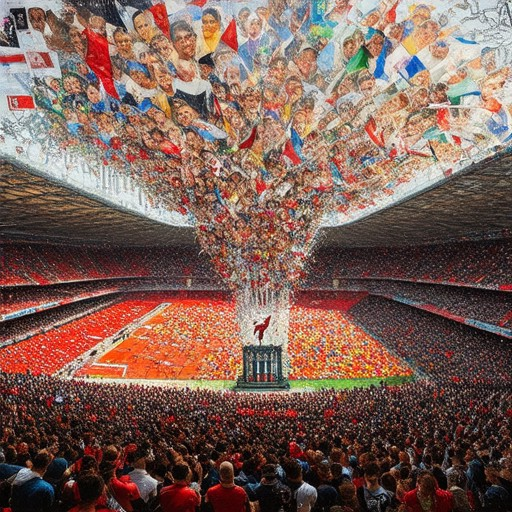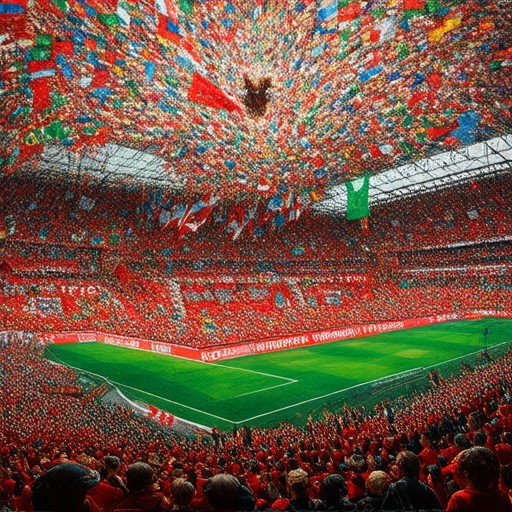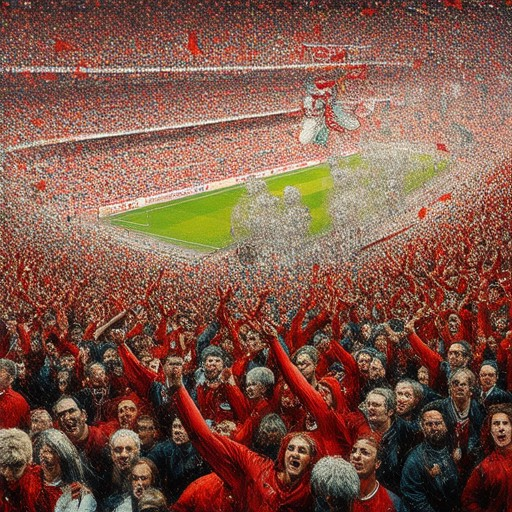“`html
Exploring Liverpool fan stories offers a unique glimpse into the heart and soul of one of football’s most passionate supporter bases. From the legendary status of iconic players to the vibrant matchday atmosphere and the rich history of Anfield, Liverpool fans have crafted a legacy of passion and pride that transcends the game itself. This article delves into the cultural significance of being a Reds supporter, the unwavering dedication of the fanbase, and the enduring impact of key figures who have shaped the club’s identity. We’ll also explore the future of Anfield, the evolution of the stadium, and the fascinating dynamics between Liverpool and their neighbors Everton. Alongside the stories of triumph and heartbreak, we’ll examine the role of the Liverpool Echo in shaping fan sentiment and the latest transfer rumors that keep supporters on the edge of their seats. Whether you’re a lifelong Reds fan or new to the fold, this journey through Liverpool fan stories promises to uncover the essence of a community united by more than just football.
“`

What are Liverpool fans called?
Liverpool fans are commonly referred to as “Kopites.”
The term originates from the iconic “Kop” stand at Anfield, which was historically a standing area for fans. Even though the Kop has transitioned into a seated section, many loyal supporters still identify themselves as Kopites, reflecting the rich legacy of the stand and its significance to the club.
How Passionate Are Liverpool Fans?
Liverpool Football Club boasts an unparalleled fanbase that is renowned for its unwavering dedication and passion. The club’s ethos, encapsulated by the iconic slogan “You’ll Never Walk Alone,” resonates deeply with millions worldwide, reflecting the deep connection between the club and its supporters.
- The Global Appeal: Liverpool’s fans span across continents, forming one of the most diverse and passionate supporter bases in football. From the Kop at Anfield to watch parties in far-off lands, the red tide unites people of all backgrounds.
- Social Media Engagement: Liverpool fans are highly active on social media platforms, driving massive engagement rates and trending hashtags during major events. Platforms like Twitter and Instagram see a surge in activity whenever the team competes.
- Community Spirit: Beyond football, Liverpool fans have built a vibrant online community through forums, blogs, and fan platforms like The Anfield Talk . These spaces foster a sense of belonging and shared identity among supporters.
- Supporter Base Statistics: With over 300 official branches worldwide, Liverpool’s global fanclub membership exceeds 15 million. This figures includes active social media followers estimated at over 50 million across major platforms.
Compared to competitors like Manchester United and Chelsea FC , Liverpool’s fanbase remains distinctive due to its intense passion and loyalty. While all clubs enjoy substantial support, Liverpool’s ability to mobilize fans globally gives them a unique edge in terms of engagement and influence.
Liverpool’s success on the pitch, combined with a rich history and cultural significance, continues to inspire generations of fans. The club’s ability to connect with people of all ages and backgrounds underscores the profound impact of football on society, with Liverpool leading the charge in fostering a passionate and united community.

Who is the Biggest Legend of Liverpool?
Liverpool Football Club has had numerous legendary figures who have left an indelible mark on the club’s history. Among these icons, Kenny Dalglish stands out as one of the greatest players of all time, earning him the nickname “King Kenny.”
Key Achievements of Kenny Dalglish
- Domestic Success : Dalglish was instrumental in Liverpool’s dominance during the 1970s and 1980s, helping the club secure five League Titles and a European Cup.
- Leadership : As a captain, he inspired his team to victory, exemplifying leadership on the pitch.
- Rivalry with Manchester United : His battles with Manchester United, particularly in the 1980s, are remembered as some of the most iconic moments in football history.
- Managerial Success : After retirement, Dalglish returned as manager and led Liverpool to further glory, including three Premier League Titles and the UEFA Cup.
Dalglish’s combination of playing success and managerial achievements solidifies his status as one of Liverpool’s greatest legends.

Will Liverpool Expand Anfield Further?
As of now, there are no confirmed plans for Liverpool to expand Anfield further. According to Liverpool’s CEO Billy Hogan, the club is currently focused on maximizing the use of the existing stadium rather than pursuing major expansion projects. However, the idea of expanding Anfield has been a topic of discussion among fans and analysts due to its historical significance and role in the club’s identity.
Anfield, with its iconic Kop stand, holds a special place in Liverpool’s history. The stadium’s capacity, currently around 53,000 after renovations, has seen many changes over the years. While the club has explored various options in the past, including temporary structures like the Anfield Road End, the priority remains on delivering a world-class experience for fans without compromising the atmosphere that makes Anfield unique.
Considering the financial constraints and the focus on sustainability, it’s unlikely that Liverpool will pursue a significant expansion in the near future. The club has consistently emphasized the importance of balancing ambition with practicality, ensuring that any development aligns with their long-term goals and the needs of the football operation.
Interestingly, several Premier League rivals have expanded their stadiums in recent years, including Manchester United, Chelsea, and Arsenal, who moved to a new state-of-the-art venue. These examples highlight the trend of clubs seeking to enhance their matchday experiences while accommodating growing supporter bases. However, Liverpool’s approach has always been distinct, prioritizing the traditional aspects of the game over purely commercial interests.
For now, Anfield remains a symbol of Liverpool’s rich heritage, and any future decisions regarding its expansion will likely be met with careful consideration and deliberation. Fans can expect the club to continue investing in improvements that respect the legacy of one of the most iconic stadiums in football.
Liverpool FC Official Website
Anfield Stadium Official Page
Is Anfield the Biggest Stadium?
Anfield, the iconic home ground of Liverpool Football Club, is widely recognized as one of the most famous football stadiums in the world. While it may not be the largest in terms of seating capacity compared to some European giants, it holds a unique place in football history.
The seating capacity of Anfield is approximately 61,276, making it the fifth-largest stadium in England. However, when considering the entire continent, Anfield falls short of larger venues like Wembley Stadium in London, which boasts a capacity of around 90,000.
Despite its size, Anfield is renowned for its rich history and passionate supporter base. It has been the venue for countless memorable moments in football, including the return of the European Cup in 2005, which brought the Champions League final to Merseyside for the first time in 31 years.
One of the most notable features of Anfield is the Anfield Road End, a historic stand that has been a part of the stadium since 1928. This section of the stadium is famous for its steep steps and is a symbol of the Anfield atmosphere.
For those interested in comparing Anfield to other large stadiums, a quick glance at a comparison chart reveals that while Anfield may not be the largest, it remains a cornerstone of football culture and continues to host top-tier matches, including Premier League fixtures and significant international games.

Why Did Everton Move from Anfield?
Everton Football Club relocated from Anfield to Goodison Park due to a rent dispute between the club’s directors and the owner of the stadium, John Houlding. The disagreement centered around the high rent demands, which led to Everton seeking a new venue for their matches.
The move from Anfield, their original home since 1892, marked the beginning of a new chapter for Everton. Goodison Park, their current headquarters, was acquired through the agreement, providing a stable base for the club’s operations and supporterbase.
This transition not only resolved the financial conflict but also set the stage for Everton’s continued growth and development. The shift to Goodison Park has been instrumental in shaping the club’s identity and legacy, ensuring a strong presence in English football history.




0 Comments